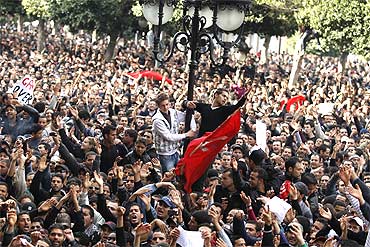 The Jasmine Revolution has consecrated a milestone which will go a long way in ushering in people-led movements in the Arab world, says Tenzin Thargay.
The Jasmine Revolution has consecrated a milestone which will go a long way in ushering in people-led movements in the Arab world, says Tenzin Thargay.
Magrib has a picturesque coastline running across the Mediterranean from Alexendria in Egypt to the straits of Gibraltar in Morocco. The earliest when this region was a witness to an upheaval was notably when Hannibal from Carthage brought Rome to its knees, crossing the Alps with his elephants.
Tunisia had always been a small and peaceful country with a layer of peace and quiet, where the French glitterati came to holiday on its beaches.
The 'Jasmine Revolution' thus literally came out of the blue (Jasmine being the national flower of Tunisia). The entire middle-class in Tunisia imploded from within and the two-decades plus regime of President Zine-al-Abidine-Ben-Ali was brought to its knees.
The catalyst for this revolution was the apparent suicide of Mohamed Bouazizi, who was traumatised after local authorities first confiscated the graduate student's vendor cart for not having the appropriate permits and then denied him appropriate redressal of his grievance.
With the average unemployment rate for college graduates in Tunisia being 23 percent and the clan of First Lady Leila Trabelsi profiting from country-wide business interests, trouble was waiting to happen.
The outbreak in Tunisia is definitely a social revolution with real people participating. The entire middle-class joined a struggle over a period of few weeks and forced the President to flee.
The Jasmine Revolution should be a cataclysmic event with far-reaching consequences because it symbolises the strong disruptive undercurrents across the entire Arab world ruled by autocrats and despots, where a cleric-dominated Islam is also prevalent.
The common feature across these countries are autocratic and authoritarian governments, with a pale shadow of a democratic edifice created from mostly rigged elections.
Right from Bashar-al-Assad's Syria touching the Mediterranean to Hosni Mubarak in Egypt to the Ayatollahs' Iran in the Persian Gulf, democracy has been the common casualty. Lebanon's fragile democracy was pulled down last week when Saad-al-Hariri's govt was reduced to a minority with the Hizbullah withdrawing support, notably under the influence of Syria and Iran. This because Saad-al-Hariri was trying to institute an investigation into the assassination of his father and former president Rafiq-al-Hariri. It took Sheikh Hasina of Bangladesh 35 years to bring her father and the country founder Sheikh Mujibur Rehman assassins to justice, so may be Saad's journey will also be a long one.
The parallel between the two being that both were facing the religious zealots ranged against them to bring their radicalised version of Islam in the respective countries. This shake-up might take Lebanon back to its two-decades long internecine civil war which reduced Beirut formerly known as the Pairs of the East to a city of rubble.
Iraq under reconstruction after the USA's ouster of Saddam Hussein's regime might become a beacon of democracy for the Middle East, but that possibility is still distant, at least 10-15 years away since the Jalal Talabani government is a propped-up regime. Moreover Muqtada-Al-Sadar, the radical Shia cleric, has returned from his self imposed exile from Iran. The Muqtada still commands fierce loyalty among the Shia faithfuls and has once led a strong opposition driving his Mahdi army against the US-lead regime from the precincts of the holy city of Najaf.
The House of Saud in Saudi Arabia controls the most important state in the Arab world, financially speaking, but they are more known for their proximity to Wahhabi Islam and are rather interested in subsidising despotic states like Pakistan, supporting a network of madrasas some of which gave birth to the Taliban in Afghanistan.
We also have Muammar-al-Gaddafi in the neighbourhood with his elite Madonna-eyed Amazonian troopers guarding him 24x7 after having survived many assassination attempts. He recently turned a friend of West after giving up his nuclear ambitions.
The Jasmine Revolution thus has consecrated a milestone which will go a long way in ushering in people-led movements in the Arab world. Recent reports from that country speak of an interim government being lead by the Speaker of the country, with the deposed president having fled to a Saudi Arabian sanctuary. The Trabelsis clan members including the former First Lady have also fled.
This definitely portends happy times for the picturesque country and the next logical step will be a free and fair electoral process where every Tunisian can exercise his/her franchise without fear.
Under the auspices of United Nations, the African union has in recent years made some positive strides, the most recent being the referendum in Sudan which might lead to two nation -- North and South Sudan. This after a four-decade long civil war looks like an achievement. It is hoped the electoral process in Tunisia will also to usher in rightful leaders.
The only worry is that the country should not end up the way it ended for Afghanistan's mujahideen with internecine infighting after their historic win over the erstwhile USSR in 1989. This worry comes because over the last two and half decades the country has no viable opposition from which the credible leadership may take shape and the entrenched bourgeoisie may cause confusion and hijack the process.
Image: Protesters demonstrate against Tunisian President Zine al-Abidine Ben Ali in Tunis January 14. Photograph: Zohra Bensemra/Reuters







 © 2025
© 2025